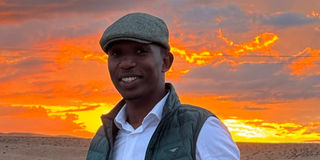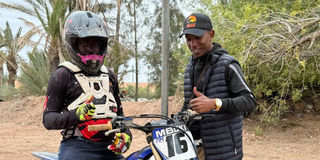Obed Bundi: The man putting Kenya on the global sports tourism map

Obed Bundi runs a sports tourism business known as Obed in the Wilderness Adventure seeks to make sports tourism a marketing destination for the country. Photos courtesy
What you need to know:
Kenya is blessed with diverse sports destinations:
- Golf: Nairobi, Nakuru, and Mombasa have top golf courses.
- Athletics: The Rift Valley is renowned for its breathtaking training sceneries.
- Water Sports: The Coast region leads in activities like kite surfing and deep-sea diving.
- Motorsports: Nairobi and Nakuru are key hubs for rally and motocross events.
Obed Bundi, 36, runs Obed in the Wild Adventures Ltd, a business focused on promoting sports tourism. He believes this is an area Kenya has largely overlooked in favour of traditional attractions like the Maasai Mara’s annual wildebeest migration, the pristine sandy coastal beaches, and wildlife conservancies. With interests across the hospitality industry, Bundi is determined to change the narrative.
How did the idea of sports tourism come about?
I would say it happened by accident through one of my top clients, who is a big sports fan. The client often requested us to book sporting events worldwide. I saw a great opportunity to capitalise on, and as a risk-taker, the gamble paid off.
Do you offer specific sports packages?
Yes, we have packages for golf tours, Formula 1, rugby, motocross, polo, athletics, and football, among others. Our packages are customised, and prices vary depending on the location and duration of the event.
What kind of sporting activities can one explore?
One can explore golf tours, Formula 1, rugby, motocross, athletics, football, basketball, and the Safari Rally Championship.
Is it a sporting circuit where participation takes place in different locations?
Yes. For example, in football, teams accumulate points over a season, much like the HSBC Sevens Rugby Series, where Kenya competes, or Formula 1, which is hosted in various countries worldwide.
Is this model of sports tourism embraced by both domestic and international tourists?
Absolutely! Sports tourism has become a stable source of revenue for many countries. Take Dubai, for example. Many assume its primary income source is oil, but in reality, tourism, particularly sports tourism, is a major contributor. I have hosted numerous international tourists eager to experience the Kenyan marathon and trace its origins.
How do you manage the low seasons?
Since there are always sporting events happening somewhere in the world, either locally or internationally, sports tourism remains sustainable throughout the year.
What are some challenges in this industry?
Sports tourism is capital-intensive. Attending sporting events and sponsoring them requires significant investment.

From booking sporting events to building an empire—one Kenyan entrepreneur is changing the game
Where do you see your business in five years?
Our vision is to become a globally recognised leader in sports tourism, offering exceptional and sustainable travel experiences that blend adventure, culture, and world-class sporting events.
Do you partner with others in the sector to attract clients?
Yes, we work with strategic partners. We also acquire clients through online marketing, referrals, and by attending sporting events, where we promote our services.
Which are Kenya’s top destinations for sports tourism, and what activities do they offer?
Kenya is blessed with diverse sports destinations:
- Golf: Nairobi, Nakuru, and Mombasa have top golf courses.
- Athletics: The Rift Valley is renowned for its breathtaking training sceneries.
- Water Sports: The Coast region leads in activities like kite surfing and deep-sea diving.
- Motorsports: Nairobi and Nakuru are key hubs for rally and motocross events.
Should Kenya invest more in sports tourism, such as bungee jumping?
Yes. Globally, sports tourism is a key driver of economic growth. For instance, the revenue generated when Kenya hosts the World Rally Championship is significant. The government should collaborate with stakeholders in both sports and tourism to form a dedicated directorate that will help unlock the full potential of this sector.
What untapped sports have the potential to boost sports tourism?
Motocross. Last year, we attended the 2024 MXOAN African Championship in Marrakech, Morocco, where Kenya was represented. I believe motocross can place Kenya on the global map and significantly contribute to sports tourism revenue.
Why do advertisements mostly focus on wildlife and beaches rather than sports tourism?
It’s true that traditional tourism gets more attention, but change is already happening. We need to move beyond the idea that Kenya’s tourism is just about wildlife safaris and beaches. Rwanda, for example, is bidding to host Formula 1 or Grand Prix races. Locally, sports tourism is gaining traction, and more providers will come on board to meet the growing demand. Tourism should not just be about sightseeing or relaxation; it must also incorporate fun and memorable experiences.
Any final thoughts?
Sports tourism is a goldmine waiting to be fully tapped in Kenya. With the right investment and strategic partnerships, the industry can become a significant revenue earner, attracting both local and international tourists. The future looks promising!

